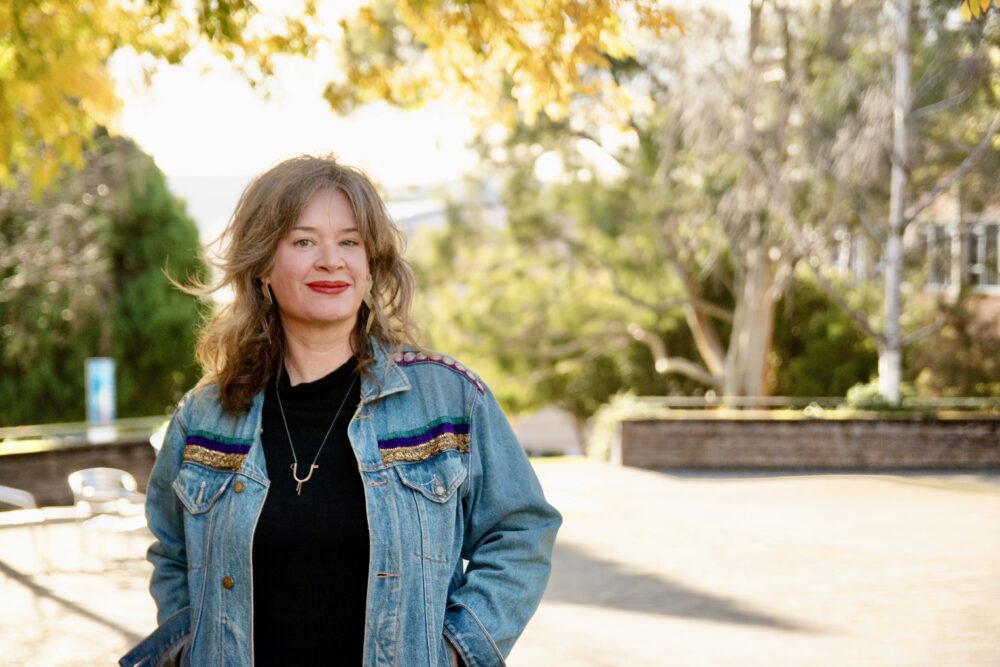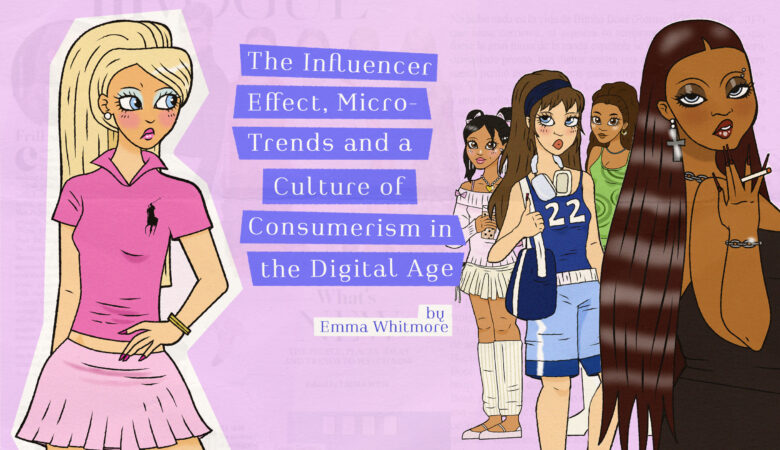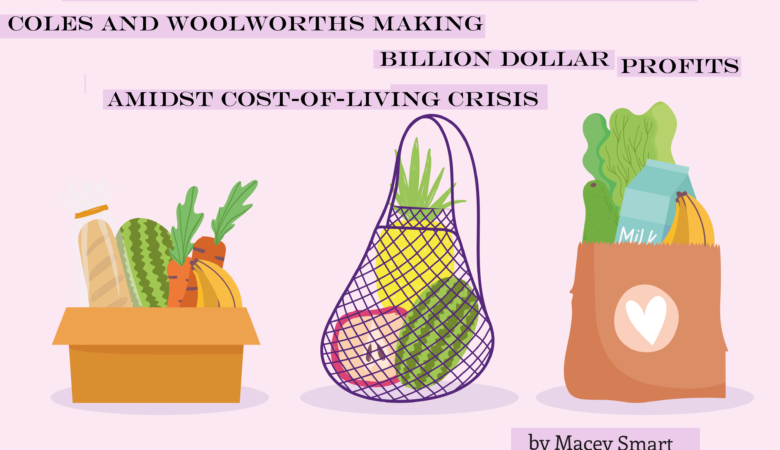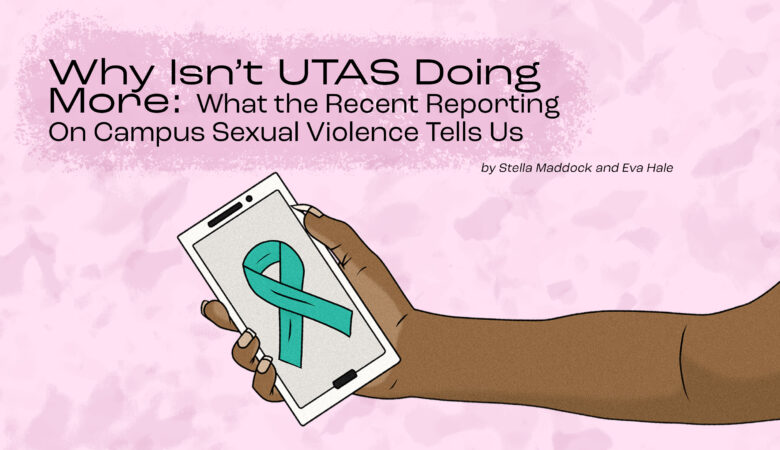We agree to meet at the fountain. When I arrive a few minutes late Kate Kelly is seated on a ledge by the stairs, gazing out at the view of Sandy Bay rolling into the Derwent. She turns to me with a smile. “It’s a beautiful campus, isn’t it?” She’s wearing lightning-bolt earrings and red lipstick, and her iconic shaggy hair glints silver in the midday sun. When my photographer comments on it, she laughs, “That’s one of the many benefits of getting older – free highlights!”
We’re here to take portraits for the profile I’m writing about Kate and her campaign for the 2022 Hobart City Council election. Turning to show the hand-sewn detail on the back of her denim jacket, she grins, “It’s cool, isn’t it?” Most of what she’s wearing has been handmade or gifted by people she knows and loves. This is not a woman who runs for election and suddenly starts compromising her style for corporate suits.
Before leaving, Kate tells us about her upcoming live music gig to raise campaign funds: A. Swayze & the Ghosts, The Native Cats and Dolphin are all playing for her. “I’m going to be paying the bands half of what I raise” she says. “I don’t believe in artists working for free.”
When I return to my campus office I stick a few of her gig handbills to my door. The design is funky and hopeful and Fight The Power glows at the top. Her wide smile and rockstar hair float in the centre. I’m reminded again of her electric energy, and how many people are coming out to support her.
It’s not hard to see why: she’s a single mum, an artist, a celebrated advocate with a wealth of lived experience, but above all, what you see with Kate is what you get. That’s a fierce combo for someone wanting to represent the Hobart community in local government.
“I’ve lived in probably 70 houses, last count.” Kate waits for me to grab a cup of tea after rushing in the door at the end of a long day, and now we’re settled in our respective lounge rooms chatting over Zoom. “I’ve lived all over Hobart – every suburb, pretty much. And each suburb has its own interesting little communities and different needs. Even such a small city, that’s something that struck me: the difference when I was living down at Seven Mile Beach to when I was living in Leslie Vale, to when I was living smack-bang in North Hobart on the roundabout.”
Apart from a three-year stint in Melbourne to study theatre, Kate has lived in Hobart her entire life. “I missed the mountain.” she says, closing her eyes and taking a deep breath. I give her a moment to envision kunanyi.
“I missed the Derwent. And I missed being able to have the water in front of me and the bush behind me. I went a bit stir-crazy in a big city – all the concrete, you know? I missed the people, I missed the warmth here. Hobart is my heart. I love it.”
Kate went to Taroona High and spent her lunch breaks in the art room. “I was a terrible student!”she admits. “I was one of those smart-but-lazy kids. I became a mature-aged student because I dropped out of high school – I was bullied pretty badly. All my tertiary studies, diploma, everything – that’s all happened as an adult.”
After stepping back from a Fine Art degree at UTAS when she was 19 and ‘not quite ready’, Kate returned to finish it in her thirties. A Diploma of Small Companies and Community Theatre, a Cert IV in Non-fiction Writing and a Cert IV in Celebrancy followed.
“As soon as I finished the celebrancy course, I started doing homeless advocacy because I was facing homelessness. And that’s where I’ve been since.”
In 2020, Kate was awarded Hobart Citizen of the Year for her work as a homelessness advocate. “All of those roles seemed separate but often you don’t have just one discipline, you have many interests. One day I turned around and there was a mountain of achievement there.”
Now, she’s ‘amping up’ her advocacy and running to be a Hobart City Councillor in the 2022 elections. “I think I’m well-positioned to be a good community representative – essentially, that’s what a Councillor is. I feel really fortunate that I’ve had such a diverse range of experiences to draw on. All the jobs I’ve done will inform me because I seek to represent the cohorts who work in those industries: low-paid hospo work, the arts, disability care.”
“You have to be able to listen to everybody, whether you agree with them or not. You need to be able to put yourself in their shoes. I’ve always had to be a fast learner, use a lot of empathy, get out of my own comfort zone. I’m always questioning my own biases and my own privilege.”
“But if you ask me to do a long equation? Forget about it!” she laughs. “I have imposter syndrome, which I think a lot of other people who dropped out of high school and are from low incomes also have… We get imposter syndrome when we start achieving things.”
I ask Kate why she’s running in the Hobart City Council elections and she nods, suddenly focused. “In the next five years we need to take serious action on climate change at every level – and I see local government as having a huge play in that. Local government manages the infrastructure: the roads, the rates, the rubbish.”
“Climate first, and let’s be brave. Instead of looking at the other cities and copying them, let’s actually be leaders! We’re very well placed to do so.”
“We need to seriously transition to as many carbon-neutral modes of transport, of housing, of heating, of everything that we possibly can. And quite radically! This is a time when there’s a call to be radical.”
“We like to plod along – we don’t like words like radical. But I would like my child to have the option to have children.”
“What that looks like at a micro level is a Battery Point walkway. More bike lanes, and incentives to get people to stop driving their cars. It looks like green spaces. It looks like rooftop gardens in the CBD, and electric buses, and a ferry service. And it looks like medium-density housing. A quarter-acre block is already wildly unsustainable and now unaffordable as well!”
“I think climate action is our biggest and most immediate challenge. A lot of people would say well, that’s not a Council issue, but I would beg to differ.”
When we talk about her vision for Hobart, Kate’s lived experience is clearly reflected in her passion for accessibility. “I’m sandwiched between two generations of people who need disability support. I provide full-time care for my son – he’s doing great! – and my mum has a physical mobility disability, and I have a psycho-social disability, so there’s quite a range of issues when the three of us decide to go to town together.” She was a carer for her partner until they passed away, for friends and family with disabilities, and has assisted individuals in palliative care. “I’ve worked with really vulnerable cohorts of people – and most of that has been as a volunteer.”
“When I’m talking about access, I’m not just talking about curb cuts. I’m talking about an attitude of inclusivity, as well as structural stuff. Maybe some of the shops have a quiet shopping time? A play area in the city, for children, would be amazing – and one that is all-ability inclusive. A swing for kids in wheelchairs, that kinda stuff! And the physical stuff for people navigating on wheels or mobility scooters or walkers. It’s pretty bad in the city.”
For Kate, accessibility is something that must be considered for all marginalised people. “What are the barriers – social, income, age, ethnicity – to civic engagement? We need those barriers to be identified and removed. Not everyone can afford to drive a car. So let’s stop doing things like knocking down houses in Dynnyrne to build extra highways. If you make your provisions with the lowest common denominator’s advantage in mind – if you make them as your baseline? It flows up. It benefits everybody.”
“There’s no such thing as trickle down. But there is trickle up. The benefits – economic, social, on every level – they flow upwards to everyone in the community.”
“We need lived experience. We need Aboriginal people to consult on what type of housing looks best for them. Older women. Students. Migrants. We need people to say actually, that doesn’t work for my cohort. And they need to have a voice in the design of these things. The community is smarter than we give it credit for.”
After working in homelessness advocacy for many years, Kate is well aware of how the housing crisis is impacting students. “No one should have to choose between food and medicine and rent. Students keep Indomie in business! I remember what that was like. Trying to run your brain on instant ramen every day?” She exhales hard.
“I’ve done a lot of facilitating and advocacy and mentoring and project management, and how I managed my success is looking at where a person was before we started working together, and where they are now. On a meta scale, if I can look at people in the community who are really struggling now – students are one of those cohorts, they’re really not being heard – and find a way to have improved their situation by the end of my term in Council? That’s my goal.”
“I’d like to see us invest in the young people here. We can’t afford to keep losing all those amazing, talented young people because they can’t afford to rent a house in their hometown!’
“We’ve been told for a very long time ‘Hobart needs to be bigger, brighter, more like Sydney or Melbourne, we need to compete, compete, compete!’ Well, I don’t think we do. We’re our own thing, and people come here for that.”
Throughout our interview, Kate has visitors. Her son comes in with a question; her dog slips through the door to cause mischief. “My dog is driving me insane – she’s chewing up the biscuit bag!”, Kate exclaims. She maneuvers the webcam so I can see the culprit. ‘Bootsy, say hi!’ As the winter sun sets early outside, she moves her laptop into the kitchen and starts making dinner for her son.
I ask her what type of representation the city will need in the years to come. “Effective leadership to me is serving first. People who think they know everything from day one make terrible leaders! It’s not about you saying what you think. It’s about you giving weight and elevation to the voices that need to be represented. You’re the tip of a wave. That’s leadership.”
“Accountability. Advocacy. Empathy. Those are the overarching values that umbrella me. They govern my actions. With all my policies – when you think about the most vulnerable person you know, and what they need? That’s what I’ll be standing for.”
I tell Kate that her refusal to play the political game of picking a popular stance and shouting from the rooftops is probably pretty threatening to the status quo. She grins at that. “Well, I’m not their candidate. And that’s okay! As I like to say: the devil has enough advocates.”








